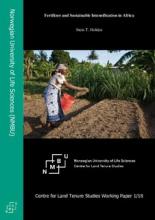Land Library
Welcome to the Land Portal Library. Explore our vast collection of open-access resources (over 74,000) including reports, journal articles, research papers, peer-reviewed publications, legal documents, videos and much more.
/ library resources
Showing items 1 through 9 of 26.The paper critically engages with sustainable development goal targets (SDG-2- Target 2.3; SDG-5) to examine how and why large-scale agricultural land acquisitions modify the social relations of women’s food access.
The paper investigates the important role of fertilizer to enhance sustainable intensification and food security in Sub-Saharan Africa based on a multi-disciplinary literature review.
We use four waves of panel data from Northern Ethiopia to investigate the link between Food for Work (FFW) participation and the diversity of food consumption and production.
This chapter is written for the European Commission for a book to be published by Springer on The Role of Smallholder Farms in Food and Nutrition Security. The author takes full responsibility for the content.
The paper provides a case study of the conversion of state land in the Commune of Limonade, from a community-controlled agricultural economy to a large-scale agro-export banana plantation called Agritrans.
The study illustrates that small holders, particularly women, are increasingly losing farmland. It questions the social development impact of large-scale land acquisitions (LSLAs) in Cameroon in terms of better living standards and reduction of poverty.
Grassroots organizations do not need to wait for the state to implement Voluntary Guidelines on the Responsible Governance of Tenure of Land, Fisheries and Forests in the Context of National Food Security (Tenure Guidelines or TGs).
Large scale land acquisitions (LSLAs) impact women: loss of rights and access to land, water resources, fuel wood, adequate shelter, compensation and livelihood. The study looks at three sub-Saharan African countries (Cameroon, Ghana and Uganda) each having different land tenure regimes.
Population growth leads to growing land scarcity and landlessness in poor agrarian economies. Many of these also face severe climate risks that may increase in the future.









